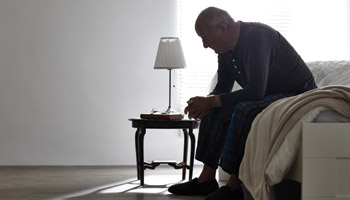Dealing with dementia, Q&As on COVID-19
This issue also covers testosterone and men's health, as well as preconception care.
Of all the disorders primary care physicians see in their practice, dementia might be one of the hardest to manage. Symptoms are progressive and difficult, yet effective interventions are few and far between. There are some tools that can be used to help patients and their caregivers navigate this often heartbreaking condition, however. Our story in this issue reviews measures that can be tried earlier in the disease course, drug and nondrug approaches, and ways to assess what is most important to the patient. A related story looks specifically at the ethical issues physicians can face when caring for patients with dementia.
Testosterone treatment may be seen as a cure-all for men's health problems as they age, but an ACP guideline released earlier this year urged caution. Men who present with chronic fatigue may have sleep apnea, for example, and erectile dysfunction can have myriad other causes. The therapy comes with its own potential risks, too, including a possible link to cardiovascular disease and prostate cancer. Our story reviews the evidence behind the ACP guideline and offers advice from experts on framing conversations with patients about health and aging.
While preconception care is often thought of as the provenance of obstetricians and gynecologists, our story discusses how internists can help manage risk factors around preconception planning for both women and men. Meanwhile, a story discusses how lipoprotein(a) can raise cardiac risk and why internists might consider testing for it in clinical practice.
COVID-19 has been the all-consuming topic on everyone's mind over the past few months, and it's prompted many changes to internists' practice. Q&As in this issue discuss some of them. Telemedicine expert and former ACP President Ana María López, MD, MPH, MACP, outlines how telehealth can be used to care for patients during the COVID-19 crisis and how adjustments now may affect care delivery going forward. Also, Diane E. Meier, MD, FACP, director of the Center for Palliative Care at Icahn School of Medicine at Mount Sinai in New York City, talks about how her facility is providing palliative care during the pandemic and why this type of care should be top of mind for all physicians now and in the future.
Our thoughts are with all of our readers during this crisis, and we aim to support you by keeping you informed on the latest news and other updates. All of ACP's excellent resources, including the continually updated “COVID-19: An ACP Physician's Guide,” can be accessed. And if there is any information you need or any angles you think should be covered, let us know at immatters@acponline.org.
Sincerely,
Jennifer Kearney-Strouse
Executive Editor




